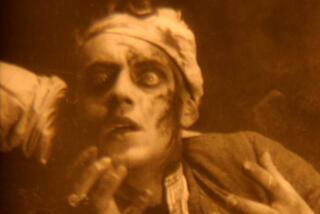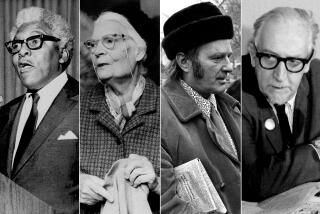Risky Path for Pacifist Europe
- Share via
World War I was far from the most evil event of the 20th century. It is hard to compete in sheer inhumanity with the Holocaust, the Stalinist terror, the Chinese Cultural Revolution or the Cambodian killing fields. Even World War II, which we recall through a fond haze of war memorial dedications and History Channel documentaries, had a far greater butcher’s bill.
But if the Great War was far from uniquely terrible, it was undoubtedly the most pointless and inexplicable of all the terrible events of the century gone by and the one that set the others in motion. We are still feeling its repercussions, from Iraq to the former Yugoslavia.
For the record:
12:00 a.m. June 9, 2004 For The Record
Los Angeles Times Wednesday June 09, 2004 Home Edition California Part B Page 13 Editorial Pages Desk 0 inches; 32 words Type of Material: Correction
Archduke Ferdinand -- The date of Archduke Ferdinand’s assassination was incorrect in a June 3 commentary on the legacy of World War I. He was killed June 28, not June 14, 1914.
The assassination of an Austrian archduke by Serbian terrorists on June 14, 1914, led to a bloody stalemate that toppled ancient dynasties (Ottoman, Romanoff, Hohenzollern, Habsburg), brought social outcasts to power (Hitler, Stalin, Mussolini) and created fresh grudges that sparked another global conflagration only 21 years after the end of “the war to end all wars.” Without World War I, there probably would have been no Nazism in Germany and no communism in Russia and hence no World War II or Cold War. Untold millions might have lived out their natural lives in something approximating peace and quiet.
I have been ruminating about these “might have beens” partly because of Memorial Day and partly because of a trip I took to France not long ago. Memorial Day is an American holiday, created after the Civil War to commemorate the sacrifices made by both sides. There was much suffering between 1861 and 1865, of course, but there was also a nobility that comes from fighting over large issues that admit no compromise: One side sought to preserve slavery and destroy the Union, the other to destroy slavery and preserve the Union. It is hard to discern any issues of comparable magnitude in all the bloodletting that occurred between 1914 and 1918. The pointlessness of it all overwhelmed me as I traveled in northern France, going from Verdun near the Meuse River to the Somme near the English Channel. On these fields, the youth of France, Britain and Germany fell by the bushel in 1916.
What stands out in my mind are the crosses -- row upon symmetrical row, stretching as far as the eye can see. “Mort pour la France,” the French ones proclaim: “Died for France.” The black German tombstones, planted on enemy soil, are denied the dignity of an epitaph. They simply bear the names of the soldiers buried beneath and the dates of their deaths. At the Somme there is a haunting inscription to the British dead: “Their name liveth forevermore.”
Almost 90 years later, there is still no agreement on why they fell. Was the war a ghastly accident that no one intended (the old consensus), or was it the product of calculated German aggression (the new consensus)? And what would have been the outcome if Germany had won: Would Kaiser Wilhelm II have established a benign forerunner of the European Union or a malignant forerunner of the Third Reich?
Historian David Fromkin takes another crack at these riddles in his excellent new book, “Europe’s Last Summer.” All we know for sure is that the Great War solved nothing and improved nothing. We know something else as well: The conflict caused the Lost Generation to recoil from war-making altogether. Because one war had been senseless, many concluded that all wars must be senseless. The myopic militarism of the pre-1914 generation produced, in reaction, an equally myopic pacifism among the post-1918 generation that gave free rein to predatory states like Nazi Germany and imperial Japan. The children of 1945, in turn, spurned appeasement and held the line against communism for almost half a century.
Now a new generation is in charge in Europe: the children of 1989. Their political sensibility was shaped by the end of the Cold War. Though they will celebrate the 60th anniversary of D-day on Sunday, World War II -- a struggle between good and evil -- no longer speaks to them. World War I exemplifies their vision of warfare: cruel and senseless. They do not want to fight alongside the United States, in Iraq or anywhere else; they see nothing worth fighting for.
It is a great mistake they are making, but an understandable one. Walking around the neatly tended graveyards of Verdun or the Somme, it is easy to see why Europeans would want to forget about war. But has war forgotten about them?
Max Boot, a senior fellow at the Council on Foreign Relations, writes a weekly column for the Los Angeles Times.
More to Read
Sign up for Essential California
The most important California stories and recommendations in your inbox every morning.
You may occasionally receive promotional content from the Los Angeles Times.













